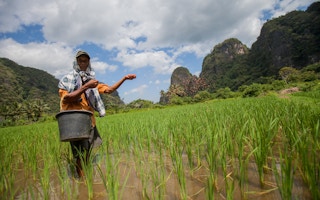Combatting climate change undeniably requires a shift from fossil fuels to renewable energy. The transition to renewable energy, however, places more burdens on some people than others, such as on workers in the fossil fuel industry. Instead of promoting a rapid shift to renewable energy at all costs, many people and organisations have argued about the need to promote “just energy transition” or a shift to renewable energy in fair and inclusive ways. The concept of just transition emerged in the United States and the United Kingdom many decades ago. In Southeast Asia, the concept is being discussed, but further refinements are needed to make it appropriate for the region.
As a start, land use and access should feature prominently in discussions about just energy transitions. Academic research has documented how renewable energy expansions have significantly impacted land-use changes, which often have adverse effects on rural populations. Expansion of renewable energy, such as solar, wind, hydropower and biofuels, also compete with agrifood production for land and water usage. Southeast Asia is no exception to this global trend, and there are many reports of large-scale land acquisitions for biofuel crops that intensified pre-existing land conflicts, such as in Indonesia, Thailand, Cambodia and the Philippines.
Since the concept of just transition originated from the experiences of labour movements, it is not surprising that conventional just energy transition measures tend to focus on labour market policies — how to protect jobs, compensate and re-skill workers in the energy sector, and create decent green jobs. However, many scholars and activists have attempted to expand the discussion of just energy transition to include concerns for providing energy access to everyone and other development objectives similar to the UN’s Sustainable Development Goals (SDGs). Given the energy-agrifood connections discussed above, policies to promote the expanded conceptualisation of just transition should also consider principles of energy justice and agrarian justice.
Energy justice requires support for the equitable distribution of benefits and harms relating to energy production and consumption. It also requires inclusive and meaningful decision-making processes, measures to address exclusions in the energy system, and compensation for past harms. Ignoring some of these principles could lead to ineffective energy policy. In Indonesia, for example, a study in 2021 found that the government focused narrowly on energy accessibility and affordability but neglected to include stakeholders such as energy-poor indigenous and minority groups in decision-making processes. As a result, the Indonesian government mainly promoted large-scale on-grid solutions and ignored small-scale off-grid renewable technologies, which could have been used more extensively to accelerate energy transition and serve the energy needs of marginalised communities.
“
Balancing energy justice and agrarian justice could be challenging due to competing land use for energy and food production, but this is an issue that cannot be ignored if one wants to promote just transition.
Agrarian justice should also be central to the design of just transition and sustainable development policies. Agrarian justice calls for access to land and land redistribution to secure the livelihoods of rural actors, especially in the face of the climate crisis and policy responses that often harm agrifood production and rural populations. Additionally, local initiatives and community-based practices to promote inclusive and climate-resilient development, such as community forests, customary land ownership and agroecology, are often neglected or portrayed as inconsequential by policymakers.
Balancing energy justice and agrarian justice could be challenging due to competing land use for energy and food production, but this is an issue that cannot be ignored if one wants to promote just transition. Moreover, policymakers in Southeast Asia should not be too quick in dismissing development innovations that emerge from grassroots experiences, especially those that help to promote agrarian justice and protect marginalised rural populations. In Thailand, for example, the People’s Movement for a Just Society (P-move) has been fighting for many decades for state recognition of community land title deeds (CLTDs). P-move is also in negotiations with the Thai government on many land-related issues. In CLTD projects, landless farmers receive usage rights over individual land plots for agricultural and housing purposes. To prevent land grabs and promote land access for those truly in need, these farmers are not allowed to sell the land plots for monetary gains. However, they are compensated when they return the land plots back to their farmer groups.
To promote a truly just energy transition, an adjustment in perspective by those in power is urgently needed. Climate change disproportionately affects vulnerable people and exacerbates poverty and inequality, while energy transition may also have adverse effects on agrifood production and rural populations. Therefore, human and economic development could be affected if there are insufficient social protection measures. This is why just transition policies should consider both energy and agrarian justice and seek to find a balance between the two. At the very least, there should be policies to promote land usage rights for marginalised populations to help meet their basic needs.
Prapimphan Chiengkul is an Associate Fellow with the Climate Change in Southeast Asia Programme at the ISEAS – Yusof Ishak Institute.
This article was first published by ISEAS – Yusof Ishak Institute as a Fulcrum commentary.


















